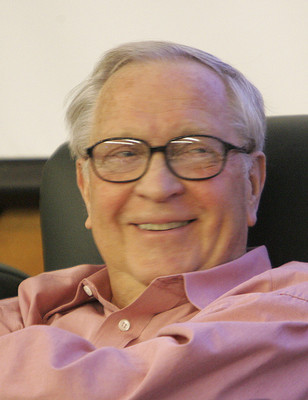Nevada medical care left behind
When Jim Rogers was diagnosed with bladder cancer three days before Christmas, the news hit him hard.
"It was like somebody taking a sledgehammer and hitting you between the eyes," the 69-year-old head of Nevada's higher education system said.
Now the visionary behind the state's Health Sciences System will leave Las Vegas for bladder reconstruction surgery at the University of Southern California's University Hospital.
The irony is not lost on local health care providers.
They say when residents leave Nevada for medical care, it's a result of a medical school that hasn't been given the opportunity to grow its own experts. They point to a lack of funding and support from state lawmakers.
"The blame rests substantially on the Legislature. It has never funded the medical school to the extent that it deserves,'' said Dr. Nicholas Vogelzang, director of the Nevada Cancer Institute.
"If you look back to the 1970s, three medical schools were started in this region: Arizona, New Mexico and Nevada. Guess which two states have great medical schools? Why do we not understand that?''
Vogelzang said New Mexico and Arizona continue to pour millions into developing their medical schools. In the meantime, the University of Nevada School of Medicine continues to fight for funding, one of the reasons it does not have a urology program, he said.
But Vogelzang said that doesn't mean Nevada residents with bladder cancer can't receive quality care here or that the surgery Rogers is getting is unavailable in the state.
Vogelzang, who specializes in bladder, kidney and prostate cancer treatment, said he regularly refers his patients to Las Vegas urologists.
In fact, he often brags about care here, especially at the cancer institute where patients from across the country and the world are treated.
"No matter where you live in the United States, there are centers of excellence for certain diseases. There is no question USC, where Jim (Rogers) is going, is one of the world's best,'' Vogelzang said.
"I don't think we should begrudge the fact that Jim (Rogers) is getting treatment there. The question is, 'How do you choose where to go if you have a rare or uncommon cancer?' You try to find the expert. That is what we are trying to build here, a system of experts."
Rogers said health care has become so specialized that it is only natural for people to leave Nevada, or any state, for treatment. He routinely receives checkups at the Cleveland Clinic in Ohio, where his cousin is a cardiologist and anesthesiologist. During one trip he talked to a heart surgeon at the renowned hospital.
"I asked him, 'How many doctors in the whole world are qualified to do the thing that you do?'" Rogers said. "He said, 'Twenty, and five of them are on my staff.'"
It has been common for top officials to leave the state for specialized care.
In 2002, then-Gov. Kenny Guinn had prostate cancer surgery at UCLA. Former Las Vegas Mayor Jan Jones went to California for breast cancer treatment in 1998. In 1996, then-Gov. Bob Miller also went to California for prostate cancer surgery.
For Rogers, his decision to have bladder cancer surgery in Los Angeles did not come down to whether Nevada had the surgeons who could do the procedure; rather it was a question of their experience.
After he was diagnosed, Rogers consulted with a Nevada Cancer Institute medical oncologist and Dr. Craig Nichols, the Portland oncologist who treated Lance Armstrong's testicular cancer.
Both pointed Rogers in the direction of Dr. Eila Skinner, associate professor of clinical oncology at USC.
She specializes in urinary tract reconstructive surgery, Rogers said, and is an expert in bladder cancer treatment in which the bladder is removed and part of the colon is used to create a new bladder.
"This is a very special, special kind of surgery. It's not that the people in Nevada are not qualified to do it; they don't do it enough," Rogers said. "Because it's such a specialized feature, it's not a fault that Nevada doesn't have the surgeons to do it. We don't have the population base" to merit it. In other words, Rogers said, the problem can't just be pinned on the amount of state funding for Nevada's medical school.
"Different places have different specialties," he said.
Dr. Victor Grigoriev, chief of urology at University Medical Center, said the county hospital performs a version of the bladder cancer reconstruction surgery Rogers will have.
Several other urologists in Las Vegas also perform the procedure, he said.
Grigoriev has been reconstructing bladders for 12 years and does about 15 to 20 of the procedures annually. "Not everyone can do it, but it is done at UMC," Grigoriev said.
"There are different ways of reconstructing the bladder. The place where he (Rogers) is going, they've been practicing this for a very long time. They have their own way of doing it," Grigoriev said.
Vogelzang said patients should always remember there are health care options.
"I strongly encourage my patients to get second opinions," he said. "That's good common sense."
Contact reporter Lawrence Mower at lmower@reviewjournal.com or (702) 383-0440. Contact reporter Annette Wells at awells@reviewjournal.com or (702) 383-0283.

















